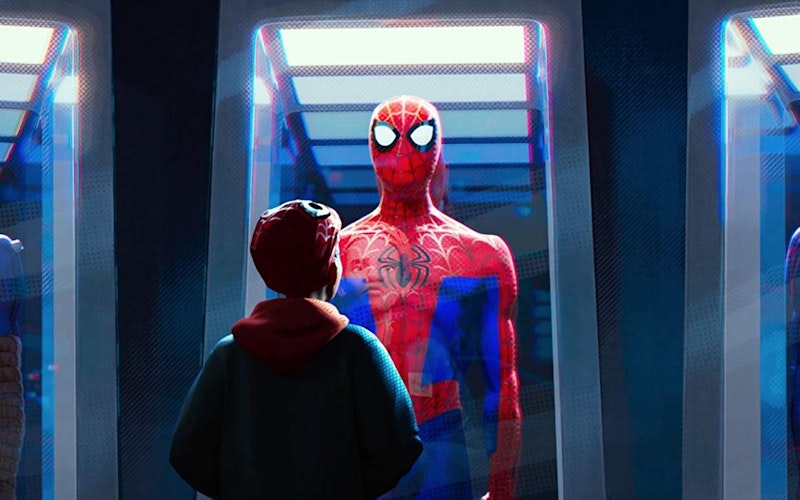
Movies
Spider-Verse’s Great Commission
Everyone knows the story: Spider-Man is Peter Parker, a nerdy teenager with spectacular powers thanks to a radioactive spider bite, powers that wreak havoc on his personal life. But in Spider-Man: Into the Spider-Verse, Spider-Man is many other things—all at once.
Courtesy of a portal that opens in time and space, we also meet Spider-Man Noir (voiced by Nicolas Cage), a trench-coated detective who speaks in the two-fisted dialogue of a pulp-fiction protagonist; Peni Parker (Kimiko Glenn), whose psychic link with a radioactive spider allows her to control a mechanical spider-bot; and Spider-Ham (John Mulaney), a talking, Looney Tunes-style pig with spider powers. There is also Spider-Gwen (Hailee Steinfeld), a punk rock drummer who doubles as a crime fighter, and middle-aged Peter Parker (Jake Johnson), whose powers haven’t prevented him from falling into a rut (complete with bulging gut).
Most importantly, Spider-Man is Miles Morales (Shameik Moore), a Brooklyn teen who gains his abilities from a genetically engineered spider. When the Spider-Man of his world is killed by the villainous Kingpin (Liev Schreiber), Miles must learn from the other spider-heroes how to master the obligations that come with his new powers.
Directors Bob Persichetti, Peter Ramsey, and Rodney Rothman (who co-wrote the screenplay with Phil Lord) know that viewers have seen the Spider-Man story thousands of times, and so they playfully remix familiar imagery with inventive touches. Miles’ initial encounters with his powers directly mirror Peter Parker’s high-school follies—hands sticking to lockers, pratfalls in front of girls, even self-deprecating thoughts appearing in dialogue balloons above his head. In fact, comic-book visuals appear throughout the movie, from dots that replicate the four-color process in early comics to the use of action lines around characters.
At the same time, the filmmakers make Miles distinct by filtering these elements through hip-hop visual language, particularly the graffiti-inspired art that Miles makes. Even when this Spider-Man seems like someone we already know, Into the Spider-Verse reminds us that Miles (who also happens to be Afro-Latino) is a unique sort of superhero.
Tension between individuality and familiarity reinforces the movie’s central theme. Where most Spider-Man stories teach us “with great power comes great responsibility,” Miles’ story shows us that anyone can be under that mask. No matter how unqualified a person might feel, no matter how different a person might be, anyone can do what Peter Parker did—anyone can be Spider-Man.
TC Podcast: Spider-Verse Spirituality
Something of the same concept underscores the Great Commission recorded in Matthew 28. Before his ascension, Jesus charged his disciples to continue the work he began, instructing them to “go and make disciples of all nations, baptizing them in the name of the Father and of the Son and of the Holy Spirit, and teaching them to obey everything I have commanded you.” That’s quite a charge for this lowly crew. Remember that Jesus’ followers were comprised of low-class fisherman and despised tax collectors. They were short-tempered and jealous. They lacked faith and constantly failed him. And yet, these were the very people Jesus chose to be his representatives in the world.
Miles—who doesn’t even have Peter Parker’s knack for science—must learn how to fulfill his own commission despite any shortcomings he might have. Thankfully, he has help from a whole universe of spider-heroes who understand his challenges and believe that he can meet them, even if his style and powers vary from theirs. As the older Peter assures him, “What makes you different makes you Spider-Man.” Christians can learn a similar lesson: that our idiosyncrasies allow us to share the gospel in uniquely effective ways.
The most breathtaking of Spider-Verse’s many striking images occurs when Miles takes a literal leap of faith, his blue-and-black costume highlighted by the city lights spiralling around him. It’s a moment both dazzling and moving because Miles finally comes into his own—becoming the Spider-Man only he can be, the Spider-Man his universe needs him to be.
Miles makes that leap because of the older Peter’s encouragement. While we don’t get help from alternate-reality mentors, we can hold onto the promise Jesus made at the end of the Great Commission: “...surely I am with you always, to the very end of the age.” Jesus assured his disciples (and us) that we all can be Christ to the people in our world, each in our own unique way.
Topics: Movies